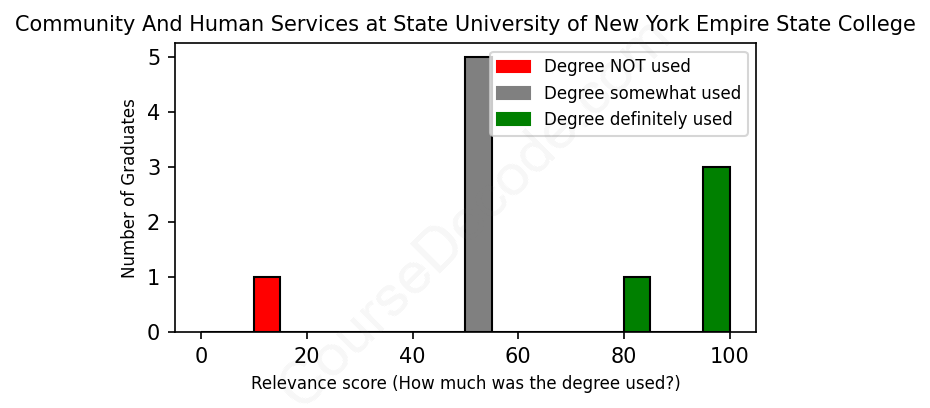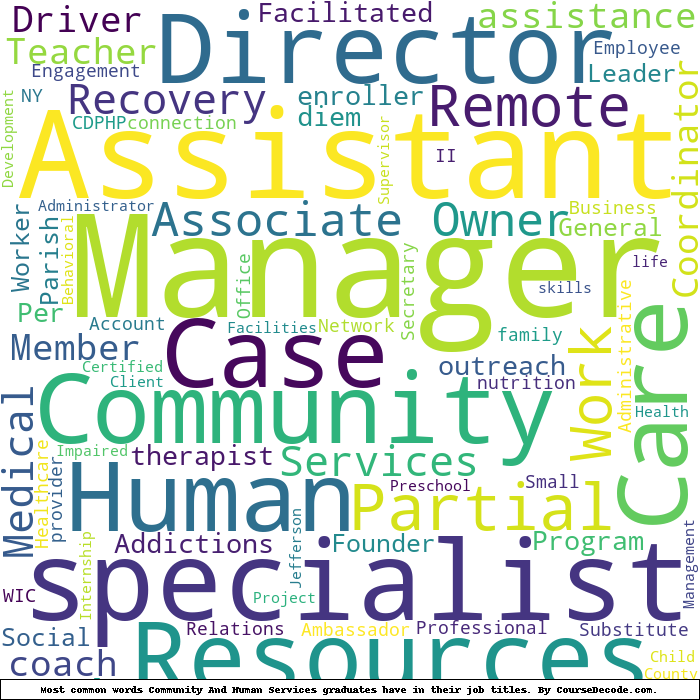
First, some facts. Of the Community And Human Services graduates from State University of New York Empire State College we've analyzed , here's how many have used (or NOT used) their degree in their career:

These are estimates based on AI analysis of 10 LinkedIn profiles (see below).
The verdict? Slightly below average. Overall, with an average relevance score of 64%, Community And Human Services graduates from State University of New York Empire State College have a slightly lower likelihood (-3%) of finding work in this field compared to the average graduate across all fields:
And for comparison, here's the chart for all profiles we've looked at across all degrees.
Also, after graduating, only 20% of these graduates have pursued further education other than another Bachelor's degree (such as a Masters degree or other), compared to the average across all profiles of 35%. This suggests a Bachelors degree is enough for most Community And Human Services graduates, and it's normal to look for work straight after graduation.
See the details:
|
Relevance score: 50% We think this person has gone into a career only somewhat relevant to their degree. We think this person has gone into a career only somewhat relevant to their degree.
DEGREE INFOGraduated in 2016 from State University of New York Empire State College with a Bachelor of Arts - BA in Community And Human Services. No other secondary education since. JOB HISTORY SINCE GRADUATIONSmall Business Owner The Frost Bread Company Aug 2018 - Present ABOUTInternet marketingSpecialties: Advertising |
The top 10 most common jobs done by the graduates we've analyzed (ranked most common to least) are:
From analyzing the job profiles of individuals who graduated with a degree in Community and Human Services from the State University of New York Empire State College, it's clear that a variety of career paths were pursued. Many graduates have taken roles as case managers, counselors, and directors in various health and community service organizations. These positions showcase a strong alignment with the skills and knowledge acquired during their studies, illustrating a direct application of their education to support families, children, and communities. For example, roles like addictions therapist and director of client and community services highlight the essential work these individuals are doing in the field, particularly in areas of mental health and community welfare.
However, not all graduates stuck strictly to jobs that were relevant to their degree. Some ventured into roles like Uber driver or office assistant, which don’t necessarily leverage their academic background in Community and Human Services. This indicates that while many chose to pursue careers directly related to their studies, others might have taken a more general route, possibly for various personal or economic reasons. Overall, it seems that a significant number of graduates have found their niche in community and human services-related jobs, but there is a notable fraction who have opted for roles that do not fully utilize their degree. This mix suggests that while the degree offers valuable skills for specific careers, graduates also explore broader job opportunities outside of their primary field.
Here is a visual representation of the most common words in job titles for Community And Human Services graduates (this is across all Community And Human Services graduates we've analyzed, not just those who went to State University of New York Empire State College):

Looking at the career trajectories of graduates from the Community and Human Services program at the State University of New York Empire State College, it seems like they generally have a good starting point right after graduation. Many graduates take on roles that are directly related to human services, such as case managers, life skills coaches, and therapists. For example, one graduate became a case manager right after finishing school and continued to build their career in various related roles, which is pretty common for many in this field. While some have explored different paths—like the graduate who drove for Uber for a few years—there generally seems to be a persistent trend toward returning to roles in human services, showing a commitment to the field.
Fast forward five to ten years, and you can find graduates in more senior or specialized positions, like directors or program managers. Many end up in leadership roles within organizations focusing on community and recovery services. For instance, several graduates are now leading important programs aimed at helping individuals with behavioral health challenges, indicating that their early experiences have equipped them well for more significant responsibilities over time. While there are some diversions from the field—like running a small business or taking on office roles—most alumni seem to be maintaining a connection to community work, contributing positively to the lives of others. Overall, it looks like a strong program that prepares graduates well for careers in human services, with many finding fulfilling roles where they can make a real impact.
Honestly, a Bachelor’s degree in Community and Human Services can be a mixed bag in terms of difficulty. At State University of New York Empire State College, or really anywhere, it’s generally considered to be less intense than some of the more STEM-focused degrees, but that doesn’t mean it’s a walk in the park. You'll dive into subjects like sociology, psychology, and ethics, which require a fair amount of critical thinking and empathy. There will be group projects, community engagement assignments, and the need to write quite a bit, which can definitely be challenging if that’s not your strong suit. Overall, it’s not the easiest degree out there, but it’s also not as heavy as some others—so if you’re passionate about the field, you’ll probably find it engaging and manageable!
Most commonly, in the LinkedIn profiles we've looked at, it takes people 2 years to finish a Bachelor degree in Community And Human Services.
From the looks of it, these graduates from State University of New York Empire State College seem to have carved out some pretty diverse career paths, but the cash flow might vary quite a bit. The ones in nonprofit and social services roles, like case managers and counselors, usually don’t rake in the big bucks, especially early on. However, the business owner and those who climbed into leadership roles like "Director of Recovery Services" probably have a better shot at decent salaries. Overall, while some might be doing alright, it seems like a mix of moderate earnings with a few potentially higher-paying roles sprinkled in. So, if you're thinking about a career in community services, just know you might need to be prepared for a bit of variability in pay!
Here is a visual representation of the most common words seen in the "about" section of LinkedIn profiles who have a Bachelor degree in Community And Human Services (this is across all Community And Human Services graduates we've analyzed, not just those who went to State University of New York Empire State College). This may or may not be useful:

Here are all colleges offering a Bachelor degree in Community And Human Services (ordered by the average relevance score of their Community And Human Services graduates, best to worst) where we have analyzed at least 10 of their graduates:
| College | Score | Count |
|---|---|---|
 State University of New York Empire State College State University of New York Empire State College
|
64 | 10 |